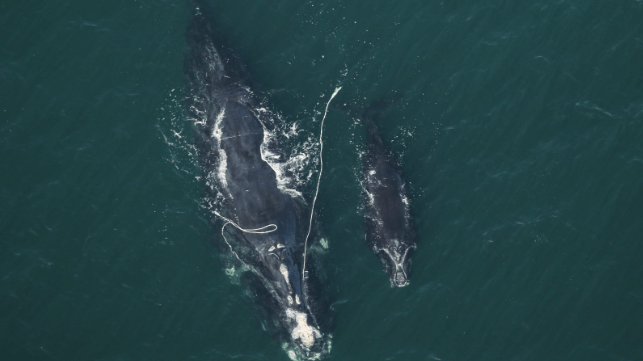Maine Political Leaders Slam Blacklisting of Lobster Fishery

Lobster is a traditional holiday dish in the U.S., but this year, it will be slightly harder to find in the supermarket. Multiple high-end retailers, including HelloFresh, Blue Apron and Whole Foods, have stopped carrying the iconic Maine lobster because it has been removed from the Marine Stewardship Council's sustainable-seafood list - much to the ire of local lobstermen and Maine's political leadership.
According to fisheries scientists, vertical-leading lobster/crab pot retrieval lines are among the leading causes of injury and death for the endangered North Atlantic right whale, along with ship strikes. There are about 364 of the whales left, and the survival of the species is now down to the survival of each individual - especially the 88 identified females of breeding age.
After a recent court decision that found that NOAA Fisheries is doing too little to protect North Atlantic right whales, a regional assessor for the Marine Stewardship Council initiated a review of the Gulf of Maine lobster fishery. On November 16, it decided to re-suspend the fishery's certification for the second time in two years, effective December 15.
Maine's lobstering industry hotly disputes the idea that lobster pot gear has a negative effect on right whales, and Maine's political leadership has embraced this message.
"There has never been a right whale death attributed to Maine lobster gear; Maine lobstermen have a 150-year history of sustainability; and Maine’s lobstering community has consistently demonstrated their commitment to protecting right whales," wrote every member of Maine's Congressional delegation and Maine Governor Janet Mills in a statement last week. "Despite this, the Marine Stewardship Council, with retailers following suit, wrongly and blindly decided to follow the recommendations of misguided environmental groups rather than science."
According to the Monterey Bay Aquarium's Seafood Watch, an average of about eight human-caused serious injuries or mortalities for North Atlantic right whales are detected and examined every year, with about six attributable to fishing gear. None of the recent incidents have been linked directly to American lobster gear, but an average of 2.6 injured or deceased whales per year are found in American waters entangled with fishing gear of unknown origin. The gear is rarely marked, and it is often hard to recover it from the whale for positive identification.

that matters most
Get the latest maritime news delivered to your inbox daily.
An estimated 80 percent of all North Atlantic right whales have been entangled in fishing gear at some point in their lives, based on scars found in observation studies. Even whales that survive the initial encounter may fare poorly going forwards. "An entanglement that results in gear remaining attached to the whale places an energetic strain that can compromise overall fitness and reproduction," noted Seafood Watch in a literature review.
The suspension of MSC certification may create an economic incentive to invest in alternative pot-retrieval technologies that are less harmful to whales (though substantially more expensive to fishermen). The industry has until mid-February to submit a new mitigation plan to its MSC assessor, or it will lose its membership in the program.
